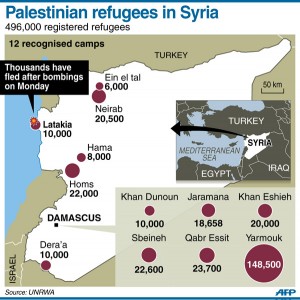Most of Filipinos in Syria ‘illegal,’ difficult to extricate, says NGO

The Pasay City-based Blas F. Ople Policy Center, in a statement on Wednesday, said years of “unabated” human trafficking of Filipino women to Syria has rendered overseas Filipino workers in conflict-ridden areas more difficult to reach and rescue.
“The Philippine Embassy would have to seek the help of local labor suppliers to find out who are employing our workers and where they can be found,” the center’s president, former labor undersecretary Susan Ople said.
According to the nongovernment organization, most of the Filipinos in Syria were relocated there by recruitment agencies based in Oman, Kuwait, Jordan, and Dubai.
“The first human trafficking case that the Ople Center ever handled was that of a Filipino domestic worker whose passport and contracts were sold from Dubai to Oman to Damascus, Syria way back in 2006. Even during that time, we were surprised to find out that we had 6,000 Filipino women illegally employed in Syria,” Ople recalled.
That number has since grown from 6,000 to a stock estimate of 17,000, the Department of Foreign Affairs said.
“The status of these workers as illegal entrants and ‘over-stayers’ contributes to their vulnerability and over reliance on their employers. Right now, our embassy and the Palace augmentation team must reach out to Syrian employers and local manpower agents in order to get to our workers. This must be handled delicately because we also need the cooperation of the Syrian government in securing exit clearances for these workers,” Ople said.
The DFA has raised Alert Level 3 over Syria, urging Filipinos there to voluntarily leave, with the Philippine government shouldering their repatriation expenses.
The Philippine Overseas Employment Administration also banned the deployment of OFWs to Syria, a move that a Manila-based recruitment consultant, Emmanuel Geslani, described as too little, too late.
“There’s nothing to ban. Filipino domestic helpers there are 95-percent undocumented,” Geslani said in a text message to the Philippine Daily Inquirer.
Geslani said he wondered why there were already 17,000 Filipinos in Syria now when in 2007, there were only about 2,000, mostly undocumented and brought by illegal recruitment syndicates.
Ople, for her part, underscored the need for “clear instructions and a candid appraisal” of the Syrian situation from and by the DFA.
“Let us avoid the usual hysterics because real lives are at stake, and the fate of our women workers there are not entirely in our hands,” Ople stressed.
According to the US State Department’s Trafficking in Persons Report (TIP) for 2011, Syria is categorized under the Tier 2 Watch List, meaning no significant efforts have been exerted by its government to curb human trafficking.
“Thousands of women— the majority from Indonesia, the Philippines, Somalia, and Ethiopia—are recruited by employment agencies to work in Syria as domestic servants, but are subsequently subjected to conditions of forced labor by their employers. Some of these women are confined to the private residences in which they work, and most have their passports confiscated, contrary to Syrian law, by their employer or the labor recruitment agency,” the US TIP Report stated.
Ople said the Philippine government, through the DFA, would need the full support of families in the country with relatives in Syria to fast-track voluntary repatriation.
“Repatriation efforts should include OFWs in dire need of rescue not just from violence in the streets but also due to violence inflicted by some abusive employers. We appeal to the families of OFWs in Syria to share whatever information they have with local and national authorities so that our Philippine Embassy can be of immediate assistance,” the former labor official said.